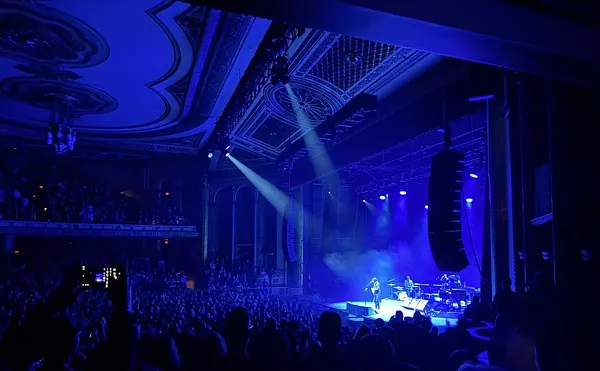
Audio By Carbonatix
[
{
"name": "GPT - Leaderboard - Inline - Content",
"component": "35519556",
"insertPoint": "5th",
"startingPoint": "3",
"requiredCountToDisplay": "3",
"maxInsertions": 100,
"adList": [
{
"adPreset": "LeaderboardInline"
}
]
}
]
In the early days Jam Rag was just another local music magazine.
Publishers Tom and Sue Ness had met at Oakland University in 1984 while she was playing classical guitar and he still had "rock star dreams." They married, moved from Clawson to Ferndale and began Jam Rag in 1986 while managing the now defunct Falcon/Mystery Lounge, near 7 Mile Road and Van Dyke. At that club, they were exposed to the politics of punk rock.
"Punk music was the alternative art that wasn’t being expressed by the mainstream," Sue says. "It exposed me to people who were critical of the government."
Tom says he and Sue truly embraced the activist mindset in 1990. "For myself, the epiphany was when my brother died. A month before, lying in his hospital bed he said, ‘You know, Tom, I’ve wasted my life.’ That just scared the crap out of me."
Sue says she supported Tom’s idea of using Jam Rag to promote political activism.
The couple belongs to the Green Party and champions several liberal causes – from promoting marijuana legalization to protesting the sanctions against Iraq. They also support the Detroit newspaper strikers. However, increasingly over the years, their attention has been focused on legalizing low power stations as a way of allowing community groups and others to break through the stagnation of corporate radio.
As leaders of the Michigan Music Campaign, the Nesses have collected thousands of letters in support of the Federal Communications Commission’s plan to legalize low-watt radio stations. Campaign volunteers have convinced 32 local governments to pass resolutions in support of the FCC’s proposal. Last year, the Nesses enlisted the help of Democratic U.S. Rep David Bonior, who has taken up the cause on Capitol Hill.
Although they’ve so far taken the legal route to push for community radio, Tom says that if the push fails, the campaign might one day help pirate radio stations get on the air.
Donations paid for about 40 percent of Jam Rag’s approximately $54,000 budget so far this year, they say. Money is tight, but they don’t mind.
"We’re so lucky to be able to work on what we want to work on," he says. "Most people are cursed with employment."
To learn more about the micro radio battle, check out www. lowpowerradio.org.





